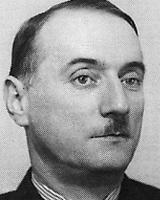
Marcel Pilet-Golaz
Encyclopedia
Marcel Pilet-Golaz was a Swiss
politician.
He was elected to the Swiss Federal Council
on December 13, 1928 and handed over office on December 31, 1944. He was affiliated to the Free Democratic Party
.
During his time in office he held the following departments:
He was President of the Confederation twice in 1934 and 1940.
Pilet-Golaz was said to be a pragmatic politician who tried to do with the German and Italian fascism
. He therefore had to face the reproach that he sympathized with fascism.
As the head of the foreign affairs, he had to find a balance between the German requirements, the objections of the Allies
and the will of Switzerland to stay independent. The way he choose, namely to build a relatively good rapport with the Third Reich, was very disputed, during as well as after the war. On 25 June 1940, Pilet-Golaz gave a speech containing numerous references to the coming of an authoritarian regime in Switzerland and to a "new order" in Europehttp://www.yrub.com/histoire/discoursgolaz.htm. In September, he met with three representative of the Mouvement national suisse, the Swiss pro-Nazi party (the MNS was disbanded by the Federal government two months later) http://www.cercle-democratique.org/target/body/figures/pilet-golaz_marcel.html.
When in 1944 he tried to take up relations with the Soviet Union, the latter refused roughly. So Pilet-Golaz lost all support and had to resign.
Switzerland
Switzerland name of one of the Swiss cantons. ; ; ; or ), in its full name the Swiss Confederation , is a federal republic consisting of 26 cantons, with Bern as the seat of the federal authorities. The country is situated in Western Europe,Or Central Europe depending on the definition....
politician.
He was elected to the Swiss Federal Council
Swiss Federal Council
The Federal Council is the seven-member executive council which constitutes the federal government of Switzerland and serves as the Swiss collective head of state....
on December 13, 1928 and handed over office on December 31, 1944. He was affiliated to the Free Democratic Party
Free Democratic Party of Switzerland
The Free Democratic Party was a classical liberal political party in Switzerland. It was one of the major parties in Switzerland until its merger with the smaller classical liberal Liberal Party, to form FDP.The Liberals on 1 January 2009....
.
During his time in office he held the following departments:
- Department of Home Affairs (1929)
- Department of Posts and Railways (1930 - 1939)
- Political Department (1940)
- Department of Posts and Railways (1940)
- Political Department (1941 - 1944)
He was President of the Confederation twice in 1934 and 1940.
Pilet-Golaz was said to be a pragmatic politician who tried to do with the German and Italian fascism
Fascism
Fascism is a radical authoritarian nationalist political ideology. Fascists seek to rejuvenate their nation based on commitment to the national community as an organic entity, in which individuals are bound together in national identity by suprapersonal connections of ancestry, culture, and blood...
. He therefore had to face the reproach that he sympathized with fascism.
As the head of the foreign affairs, he had to find a balance between the German requirements, the objections of the Allies
Allies of World War II
The Allies of World War II were the countries that opposed the Axis powers during the Second World War . Former Axis states contributing to the Allied victory are not considered Allied states...
and the will of Switzerland to stay independent. The way he choose, namely to build a relatively good rapport with the Third Reich, was very disputed, during as well as after the war. On 25 June 1940, Pilet-Golaz gave a speech containing numerous references to the coming of an authoritarian regime in Switzerland and to a "new order" in Europehttp://www.yrub.com/histoire/discoursgolaz.htm. In September, he met with three representative of the Mouvement national suisse, the Swiss pro-Nazi party (the MNS was disbanded by the Federal government two months later) http://www.cercle-democratique.org/target/body/figures/pilet-golaz_marcel.html.
When in 1944 he tried to take up relations with the Soviet Union, the latter refused roughly. So Pilet-Golaz lost all support and had to resign.

